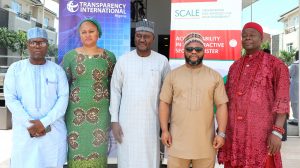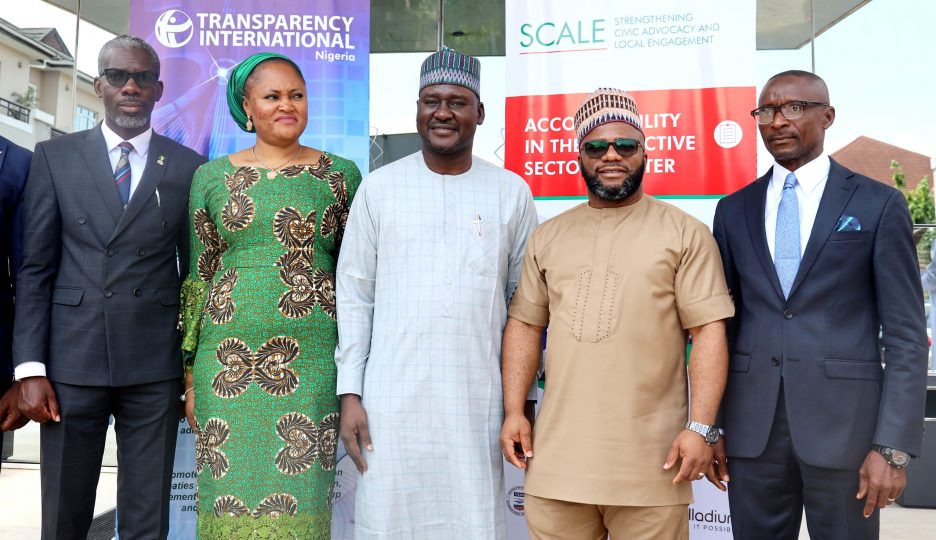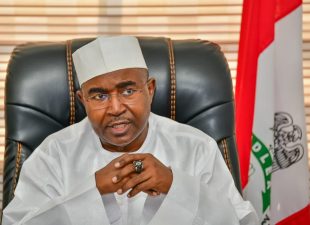By BASHIR ADEFAKA
Tuesday June 22, 2022 would pass for a good day in the activities of civil society groups, particularly the Civil Society Legislative Advocacy Centre (CISLAC) partnering with the Federal Government in ensuring, not only that the Petroleum Industry Act (PIA) now in place, to which President Muhammadu Buhari signed the Petroleum Industry Bill (PIB) a year ago, is said to have been implemented but also to see that the implementation works.
It will be recalled that on August 16, 2021, President Muhammadu Buhari signed the Petroleum Industry Bill (PIB) 2021 into law, with the Petroleum Industry Act (PIA) providing a legal, governance, regulatory and fiscal framework for the Nigerian petroleum industry, the development of host communities and related matters.
Further to this, the Presidency approved a nine-member steering committee to ensure the implementation of the Petroleum Industry Act (PIA) with an implementation structure comprising a steering committee and an implementation working group and a coordinating secretariat.

Left-Right: Civil Society Organisation Desk Officer, Nigeria Upstream Petroleum Regulatory Commission (NUPRC), Mr. Mohammed Lawal, Director of Finance, Strengthening Civic Advocacy Local Engagement (SCALE), Mrs. Domini Maduhu, Executive Director, Civil Society Legislative Advocacy Center (CISLAC), Mr. Auwal Ibrahim Musa, Executive Commissioner Economic Regulation and Strategic Planning, NUPRC, Dr. Kelechi Ofoegbu. and Representative of the HRM Oduosa of Utagba- Ogbe Kingdom, Deilta State, Chief.Dennis Ejechi, at the Consultative forum on legal framework review in Extractive Sector organised by CISLAC in Lagos on Tuesday June 22, 2022. PHOTO: ETOP UKUTT
While steering committee had the job of effective and timely implementation of the law in the course of transition to the new petroleum industry envisaged in the reforms programme and ensuring that the new institutions created have the full capability to deliver on their mandate under the new legislation, the implementation working group and coordinating secretariat had the onerous task of developing the briefs (including model contracts and regulations) that would be presented to the steering committee for consideration and approval within a 12-month duration.
CISLAC, which is the national chapter of Transparency International in Nigeria, in giving life to this, brought stakeholders from across the sector mainly Nigeria Upstream Petroleum Regulatory Commission (NUPRC), the Federal Inland Revenue Service (FIRS) and from the host communities including those from oil producing and solid mineral sectors, on a roundtable where a holistic conversation was held on legal framework review in the extractive sector, organized in partnership with Strengthening Civic Advocacy and Local Engagement (SCALE) and the Accountability in Extractive Sector (AES) Cluster, and supported by United State Agency for International Development (USAID).
At the roundtable tagged, “Consultative Forum of Legal Framework Review in Extractive Sector”, the lead driver, CISLAC Executive Director, Mr. Auwal Ibrahim Musa (Rafsanjani), said, “In view of our respective mandates, roles and agenda, we have convened this gathering of stakeholders who we believe are crucial to advancing the implementation of significant reforms in the extractive sector.”
He said, “Getting all stakeholders to work is the reason for the struggle in the last 20 years to have a law in place. Now the law is in place but the law will be useless if it is not implemented in manner that makes things work for the sector.”
Rafsanjani could not stomach the reality that Nigeria has crude and still goes somewhere else to buy fuel. To this end, he pointed attention of the selected audience to Niger Republic where things work well with its extractive sector particularly the oil industry because the stakeholders there are more serious about what they have. “It might even be experts from Nigeria that go there and make their oil sector work over there, but we can stay here and still make it work for ourselves,” he submitted.
Among the areas looked at during the consultative forum was the need to treat lives in the host communities as important being, according to the CISLAC boss, “the country will not be doing well, if it only shows interest in the extractive sector but leave out the welfare of people in the oil producing area” and by this he was speaking to oil spillages and gas flaring that have made life unbearable for the people living in the area.
Making the intention of the group clearer, the CISLAC Executive Director said: “We are partners in progress. We are not here to criticize or blame the government. That is not what we are set out for in CISLAC because, if things don’t work for government, it also affects us. We are aware that there are many countries that envy Nigeria and who will not want things to go well with us. There are countries that have war situation and, to run to neighbouring countries, is hard for them. How then can we not join hands together to make our own country work for all of us?” He asked.
At the forum, the Director of Finance, Strengthening Civic Advocacy Local Engagement (SCALE), Mrs. Domini Maduhu, corroborated CISLAC boss by saying that although the law, as seen with PIA, is in place but that it is not just having the policy in place that matters but making it work is important.
In his remarks, the Executive Chairman of FIRS, represented by Femi Olarinde, his Technical Assistant on Tax Policy, appreciated the effort of CISLAC in partnering with authorities in driving the process to ensure that government policies work. Agreeing with the CISLAC boss, Auwal Ibrahim Musa earlier statement that the struggle to get a law to make the extractive sector work had spanned 20 years, he said the Federal Inland Revenue Service had come a long way with the law than to withdraw at this implementation stage.
“We have invested a lot for the last 20 years and so will not want to end badly,” he said, adding that his FIRS is responsible for the enforcement of the provisions of Chapter 4 of the Petroleum Industry Act (PIA) being discussed as it relates to taxes.
The FIRS boss, in appreciation of CISLAC’s effort, said: “There is a role for civil societies and media in tax system and what CISLAC has done is one of the roles and we congratulate them.”
He said FIRS was also saddled with the task of assessing and collecting hydrocarbon taxes, companies’ income tax and education taxes from the oil and gas industry.
“The commission is also to determine and collect royalties, signature bonus and related payments of production shares, profit oil from the upstream petroleum sector.
“We are also the authority to determine and collect all related payments from downstream and midstream sectors of the industry including gas flare penalty. And all monies collected (taxes, royalties, profit oil, signature bonuses etc) from the petroleum industry due to the government shall be timely transferred to the Federation account.”
As major driver of the reforms for which Tuesday consultative forum held at the Amber Residence in GRA, Ikeja,Lagos, Executive Commissioner Economic Regulation and Strategic Planning, Nigeria Upstream Petroleum Regulatory Commission (NUPRC), Dr. Kelechi Ofoegbu, gave a powerpoint presentation of what his Commission has done since it was set up and inaugurated by President Muhammadu Buhari barely one year ago.
He said to members of the public it was as if the Petroleum Industry Bill signed by the President to thus become Petroleum Industry Act was just pushed under the table without anything done to implement. To this end, the NUPRC Executive Commissioner said his Commission had been holding consultations and moving from public hearing at the National Assembly to consultation meetings with all stakeholders and that, now because they had reforms going to a hundred and fifty, it had to optimize to see where some of those things could be merged together and arrive at implementable number of reforms, which he said were already done.
Ofoegbu, whose presentation was titled “Nigeria Upstream Petroleum Regulatory Commission Update on PIA Implementation Process”, gave an outline of the Commission’s performance namely as: Regulations arising pursuant to PIA 2021; Licences and model contracts; Delineation of acreage, Onboarding of consultants; Status of regulatory review; Mapping of ‘proposed’ to ‘optimised’ regulations, which he claimed is where the major work is, and then gave his conclusion.
Ultimately, Ofoegbu said government did not work alone in the drafting of the PIB that led to the law, PIA, and in listing the regulations, he said, “The Act also says regulations have to be gazette and gazetting is the function of Minister of Justice”, this he said is being worked upon as at the time he was speaking in Lagos on Tuesday June 22, 2022.
He said taking away government involvement before drafting the regulations was at the back of the mind of the makers and that the steering committee handling the implementation process of the PIA ensured a tripartite governance structure essentially structured by the host communities.
He said implementation of the law was at review stage whereby in July this year, stakeholders feedback will be taken. “Next week Tuesday June 28, 2022, everybody that has been qualified to be awarded a field will be presented licence.”
He said, “The philosophy behind the PIA is that we want activities every time and everywhere” adding that “what is now done is to resize the field to avoid situation where like Shell, operator would have large size but operate small portion, no.” He said each operator that has been awarded a field and given licence will now be called upon assessed base on his performance.
To this end, he said, “The difference between former DPR and NUPRC is, this Commission is the people’s project.”
Journalists and other participators, who contributed to the conversation congratulated the NUPRC for the job well done but expressed dismay that the Commission had to wait to be asked to explain before making people know what they are doing. Through the Executive Commissioner, Kelechi Ofoegbu, the Commission was asked to collaborate more with the civil society and media organizations to let members of the public be fully aware of what they are doing as, they said, it does not give them a pass mark when they are working assiduously the way they had now been seen to be doing but not even many media organization are in the know talk less that the average man in the street.
Representatives of host communities who spoke included the representative of His Royal Majesty Oduosa Utagba-Ogbe Kingdom, Delta State, High Chief Dennis Ejechi, President of Mining Federation Host Communities, Mr. Habibu Wushishi, from Niger State and Legal Counsel, Ibeno Community, Akwa Ibom State, Barr. Diamond Akpanika.
They made presentations on “Extractives Host community development: Expectations within Petroleum Industry Act (PIA)” during which High Chief Ejechi voiced out his appreciation of Executive Commissioner of NUPRC, Dr. Kelechi Ofoegbu, “who now made things clear to us that government is not just sitting down doing nothing about the PIA”. He, however, had issue with the three percent said to be managed by host communities as to how government would determine that the operators, who are mainly Asians, would be sincere enough to declare what they make in order to ensure the country is still not being shortchanged by what they claim they make.
In his own submission, Habibu Wushishi was averse to the only mention of oil sector and PIA without a single mention of solid mineral sector in the whole of conversation.
The President Mining Federation Host Communities, Wushishi, who called Niger State ‘Power State’, explained why.
“Oil has just been discovered in commercial quantity in the Bida area of Niger State. There is solid mineral in virtually all the 25 Local Government Areas of the state. Niger State has produced two Military Heads of State, one Inspector General of Police, one Commandant General of the Nigeria Security and Civil Defence Corps, has two hydropower bases that produce electricity for the rest of Nigeria. Reason Niger State is Power State but powerless,” he sadly said.
Powerless, he continued, because “it is a state bedeviled by insecurity with its members being killed every day, women raped and so on and so forth and all these being done by bandits”.
He said, “People only talk about oil. What about the solid minerals, if what is good for the goose is also good for the gander? What many have failed to realise is that the banditry we have in Niger State, which started in Zamfara and now in Sokoto, Katsina, is all because of solid minerals that are there.
“This is because foreigners who are involved in extractive sector as far as solid minerals are concerned want to drive the people away from the areas so that they can have total, unhindered access and control of the solid minerals there. So, if PIA has been done for the oil producing sector, there should also be a similar law for the solid minerals host communities,” he said.
Wushishi concluded his presentation by making demands on behalf of the solid minerals host communities which included that law that regulate activities of operators in the mining sector as failure to have regulated activity cause of bandit insecurity in the sector, provision of adequate security for the host communities, continuous plan about mining business and expansion of the Mineral Resources and Environmental Management Committee to cater for some of the things that will bring about good living system for the people in the solid minerals host communities.




